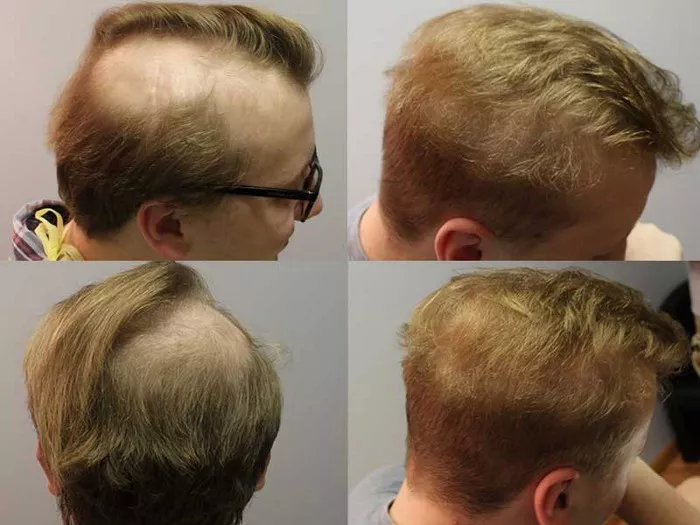Hair loss is a common yet distressing phenomenon that many individuals experience after undergoing surgery. This issue, known as telogen effluvium, can cause significant anxiety for patients already dealing with the stress of recovery. This article aims to provide a comprehensive understanding of post-surgical hair loss, including its causes, duration, and effective management strategies to alleviate concerns and guide patients toward recovery.
Causes of Hair Loss After Surgery
1. Physiological Stress
Surgery imposes significant physical stress on the body, which can disrupt the normal hair growth cycle. The body prioritizes essential functions over hair growth during recovery, leading to hair shedding.
2. Medications
Certain medications administered during and after surgery can contribute to hair loss. Anesthetics, antibiotics, and anticoagulants are known to impact hair follicles temporarily.
3. Nutritional Deficiencies
Post-operative dietary restrictions or poor nutrient absorption can lead to deficiencies in essential vitamins and minerals, such as iron, zinc, and vitamins A and D, which are crucial for healthy hair growth.
4. Hormonal Changes
Surgical procedures, particularly those involving hormonal organs (e.g., thyroid or adrenal glands), can lead to hormonal imbalances. These imbalances can disrupt hair growth cycles, resulting in hair shedding.
5. Scalp Trauma
Surgeries involving the head or scalp can directly damage hair follicles or alter the local blood supply, leading to localized hair loss.
The Hair Growth Cycle: An Overview
To understand post-surgical hair loss, it’s essential to grasp the hair growth cycle, which consists of three phases:
Anagen (Growth Phase): Lasts 2-7 years, where hair actively grows.
Catagen (Transition Phase): Lasts 2-3 weeks, where hair growth slows, and follicles shrink.
Telogen (Resting Phase): Lasts 3-4 months, where hair rests before shedding and new growth begins.
Surgery can cause a significant number of hair follicles to prematurely enter the telogen phase, leading to diffuse hair shedding.
Duration of Hair Loss After Surgery
Acute Phase (1-3 Months Post-Surgery)
In the initial months following surgery, patients may notice increased hair shedding. This phase aligns with the telogen phase, where hairs that entered this resting state due to surgical stress begin to fall out.
Subacute Phase (3-6 Months Post-Surgery)
Hair shedding typically peaks around 3-4 months post-surgery. During this period, patients may experience noticeable thinning. However, new hair growth may begin as hair follicles exit the telogen phase and re-enter the anagen phase.
Recovery Phase (6-12 Months Post-Surgery)
Most patients see significant improvement in hair density by the 6-month mark, with continued growth and thickening over the next several months. Full recovery can take up to a year, depending on individual health, age, and the extent of the surgery.
Factors Influencing Hair Loss Duration
Type of Surgery
The severity and type of surgery play crucial roles in the duration of hair loss. Major surgeries with prolonged recovery periods tend to cause more extended hair loss periods compared to minor procedures.
Patient’s Health and Age
Younger, healthier individuals typically recover faster from surgery, including the normalization of the hair growth cycle. Older patients or those with underlying health conditions may experience prolonged hair loss.
See Also: Does PTSD Cause Hair Loss: Things You Need To Know
Post-Surgical Care
Proper post-surgical care, including balanced nutrition, adequate rest, and stress management, significantly impacts recovery time. Patients who follow their healthcare provider’s recommendations closely often experience shorter durations of hair loss.
Managing Post-Surgical Hair Loss
1. Nutritional Support
Maintaining a balanced diet rich in vitamins and minerals essential for hair growth is crucial. Foods high in iron, zinc, biotin, and vitamins A, C, and E should be included in the diet. Supplements may be recommended by healthcare providers if dietary intake is insufficient.
2. Stress Management
Since stress exacerbates hair loss, adopting stress-reduction techniques such as mindfulness, yoga, and meditation can be beneficial. Adequate sleep is also vital for overall recovery and hair health.
3. Topical Treatments
Minoxidil (Rogaine) is an over-the-counter topical treatment that can promote hair regrowth. It’s essential to consult with a healthcare provider before starting any new treatment to ensure it’s appropriate for the individual’s condition.
4. Medical Interventions
In cases of significant hair loss, medical interventions may be necessary. Platelet-rich plasma (PRP) therapy, low-level laser therapy (LLLT), and prescription medications such as finasteride can be effective but should be discussed with a healthcare provider.
5. Scalp Care
Gentle scalp care, including using mild shampoos and avoiding harsh treatments or tight hairstyles, can help maintain scalp health and support hair regrowth.
6. Regular Follow-Ups
Regular follow-ups with healthcare providers are crucial for monitoring progress and adjusting treatment plans as needed. These appointments provide opportunities to address any concerns and ensure optimal recovery.
Psychological Impact and Support
Hair loss can have a profound psychological impact, affecting self-esteem and emotional well-being. It’s essential to acknowledge these feelings and seek support if needed.
1. Counseling and Therapy
Speaking with a counselor or therapist can help manage the emotional impact of hair loss. Support groups, either in-person or online, can also provide a sense of community and understanding.
2. Cosmetic Solutions
Temporary cosmetic solutions, such as wigs, hairpieces, and hair thickening fibers, can boost confidence during the recovery period.
Conclusion
Hair loss after surgery, while distressing, is typically temporary and can be managed with proper care and support. Understanding the causes and duration of post-surgical hair loss allows patients to navigate this challenging period more effectively. By prioritizing nutrition, stress management, and regular medical follow-ups, most individuals can expect to see significant improvement in their hair density within a year. For those struggling with the emotional impact, seeking psychological support and exploring cosmetic solutions can provide additional relief. Ultimately, patience and adherence to a comprehensive recovery plan are key to overcoming post-surgical hair loss and regaining healthy, vibrant hair.


